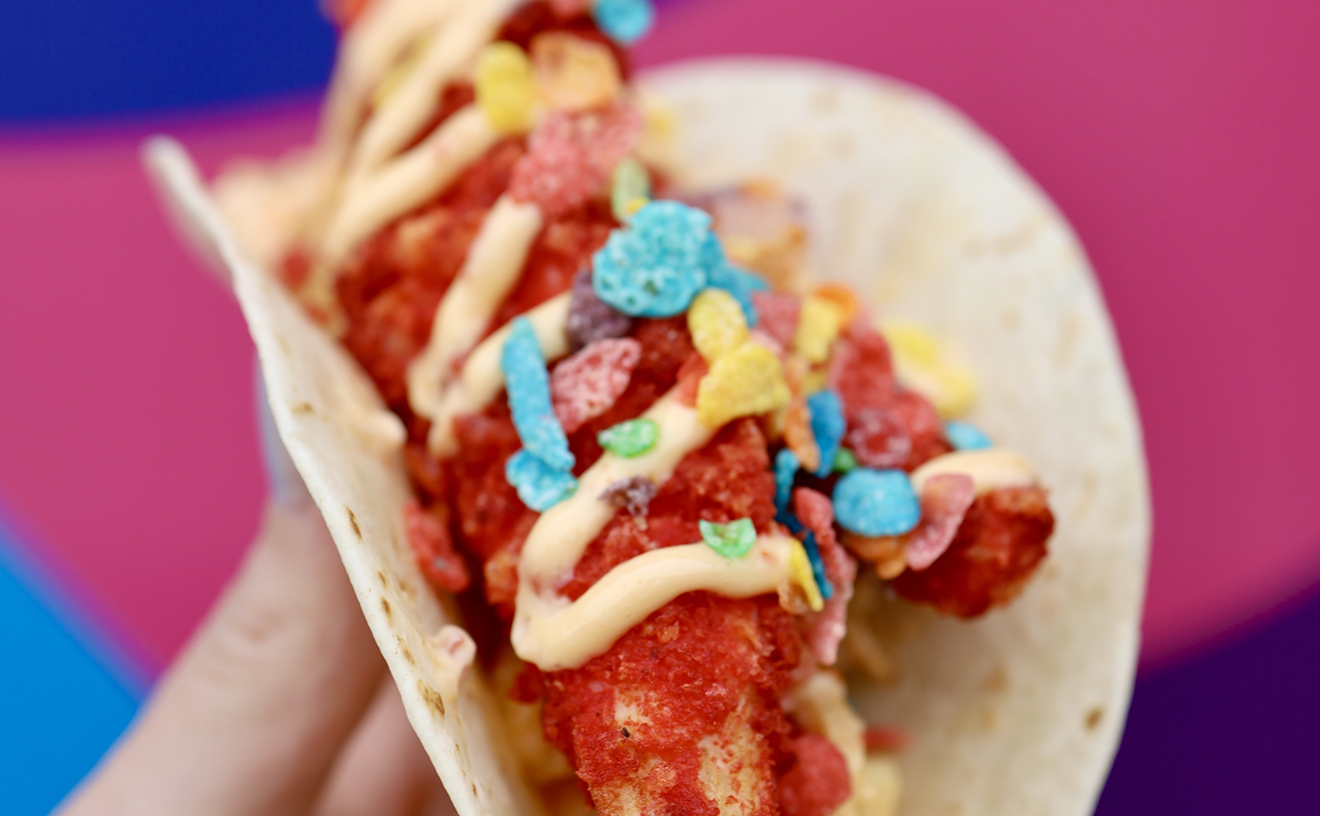Yuga is a family affair, owned by chef Chika Abe and his wife Yasuko, who are also proprietors of Izakaya a few blocks away on Aragon Avenue and the always reliable Lan Pan-Asian at Dadeland Station in Kendall. The Abes' daughter Kazu and her husband, chef Johnson Teh, run Lan as well as Yuga. Teh was tending to the latter's kitchen during our visits, making frequent forays into the restaurant not only to introduce himself to diners, but also to help serve dishes — a friendly, personal touch that will likely end once Yuga gets discovered, the crowds descend, and the chef becomes too busy to do so (it has been open only since mid-August). Service is solid enough without him — the staff amiable, knowledgeable, and efficient.
Teh and Abe have crafted an innovative, sushiless menu unbound by expectations of what Japanese food should be. Some two dozen refined compositions are classified into "ocean temptations," "meats," "green plates," "rice and noodles," and a quartet of nightly specials. Most selections run between $6 and $14, the low end representing small-plate servings, the higher prices indicative of slightly larger but not quite entrée-style portions. The idea is for diners to order many dishes and share with a generosity of spirit, but the food is so exceptional that it's difficult to resist the urge to selfishly snare, say, that last petite snippet of seared sea scallop splashed with sansho-peppercorn sauce.
Items are served willy-nilly as they finish cooking, so you might want to begin by ordering a select number of seafood and vegetarian courses and then, a little later, place a second request for some of the meatier, more substantial dishes. The first plate to arrive at our table was one of the "green" picks, a trio of soybean treatments that reflects Chef Abe's background in macrobiotic cooking. Centering the rectangular arrangement was a little glass bowl of cold silken tofu, the luscious white custard topped with shreds of shirasu (teeny white sardines) and shiso mint. To the right sat a delectable croquette made of okara (a.k.a. unohana, a.k.a. kirazu, a.k.a. "honorable pulp," the high-fiber remnant of tofu or soy milk production) mixed with minced shrimp, onions, and herbs; the patty floated on a creamy avocado sauce heightened with a spike of rice vinegar. To the left was a tofu fritter flecked with wakame, edamame beans, carrots, and wood ear mushrooms served atop shiitake slices and glazed in an earthy mushroom sauce. The same fantastic fritter, but larger, is available over bok choy and listed on the menu as "ganmo tofu steak."
Another terrific trinity of seductive tastes was tendered via raw fish three ways: diced cubes of big-eye tuna topped with sparkling orange flying fish roe, white fish marinated in a sweet and picklishly pungent ume-plum sauce, and a tropical snapper ceviche of pineapple, litchi, and lime juice. More fish dishes for your wish list: a pot of small asari clams (similar to littlenecks) steamed with petite discs of sweet Chinese sausage in an invigorating sake broth; a pristine, crisp-skinned fillet of seared striped sea bass on a raft of napa cabbage-spinach rolls over ethereal dashi broth; and a "monkfish foie gras" roll featuring the richer, more tasteful cousin of cod liver parceled in a thin, crunchy fried wheat wrapper along with snapper, shiitakes, green onions, and ginger. A different but similarly sumptuous satoimo roll engaged us with its softly fried, golden brown soybean skin encasing a buttery purée of whipped taro and blue crab.
The flavors found at Yuga are subtle yet stunning, a dainty but daring calibration of sweet, tart, salty, and spicy that ignites into singular bursts of exquisite taste — except for age gyoza, better known as fried dumplings, the only dud encountered. The wrappings were brittle as a fortune cookie, and the minced chicken and mushroom interiors were unremarkable.
Nothing here can accurately be described as heavy, but a pile of sweet-and-sour glazed lamb ribs will stick to your own ribs, as will grilled and garlicky beef short ribs. A sensationally tender Berkshire pork chop pooled in a mildly sweet ginger sauce proved pleasantly hearty, too, as did plump smoked chicken wings in garlic-soy glaze. The wings are the sole menu item marked with a chili-pepper symbol, presumably to warn of heat, but don't let this designation scare you away; like much of Yuga's cuisine, they are spicy in a mildly modulated manner.
The "rice and noodle" menu section comprises only a paltry pair of offerings, but both packed plenty of flavor. Cha soba, spaghettilike strands of cold green tea buckwheat noodles, were tender yet toothsome, and splendid when tossed with sides of scallions, ginger, and aromatic miso broth. And the rice dish wowed by way of perkily piquant brown curry sauce slathered over slabs of meltingly soft beef, with choice of brown or white grains on the side.
A compact selection of California wines and Japanese beers is on hand, as are premium sakes from independent microbreweries (sold in small and affordable bottles, starting at $21). A sake flight of four varieties isn't listed on the menu but is available upon request for $18.
Even omnipresent Asian desserts such as green tea ice cream and mochi seem superior here. The former is fully flavored without relying on too much sugar and comes garnished with beautiful little berries and a sprig of spearmint leaves. Mochi, which has been bastardized into an ice-cream treat served at American sushi restaurants, is authentically presented as a patty of sticky rice dough thickly encasing sweetened red bean paste. These rice cakes are traditionally enjoyed on the Japanese New Year, and the media in that country annually report on the number of elderly people who perish from choking on mochi during festivities — the rice being so glutinous it doesn't easily dislodge via the Heimlich maneuver. This tragedy assuredly won't befall you at Yuga, but if it did, at least your loved ones could take comfort in knowing it was while dining on food that truly is to die for.











